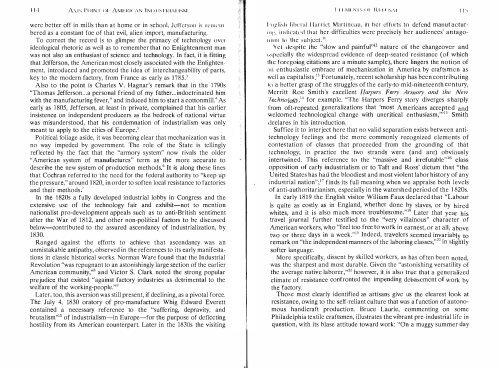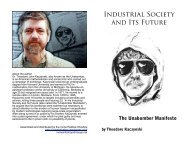CONTENTS - ouroboros ponderosa
CONTENTS - ouroboros ponderosa
CONTENTS - ouroboros ponderosa
Create successful ePaper yourself
Turn your PDF publications into a flip-book with our unique Google optimized e-Paper software.
11·1 A,'\ [s 1'(lINT (li' AMI'I{I( 'AN I N I)lISTI II\ I ,ISM<br />
were better off in mills than at home or in school, JdTers()Jl is n llIl'lll<br />
bcrcd as a constant loe of that evil, alien import, manufacturing.<br />
To correct the record is to glimpse tile primacy of technology over<br />
ideological rhetoric as well as to remember that no Enlightenment man<br />
was not also an enthusiast of science and technology. In fact, it is fi tting<br />
that Jcfferson, the American most closely associatcd with the Enlighten<br />
ment, introduccd and promoted the idea of interchangeability of parts,<br />
key to the modern factory, from France as early as 1785.'<br />
Also to the point is Charles V. Hagnar's remark that in the 1790s<br />
"Thomas Jefferson ... a personal friend of my father ... indoctrinated him<br />
with the manufacturing fever," and induced him to start a cottonmill.' As<br />
early as 1805, Jefferson, at least in private, complained that his earlier<br />
insistence on independent producers as the bedrock of national virtue<br />
was misunderstood, that his condemnation of industrialism was only<br />
meant to apply to the cities of Europe.'<br />
Political fo liage aside, it was becoming clear that mcchanization was in<br />
no way impedcd by government. The role of the State is tellingly<br />
reflected hy the fact that the "armory system" now rivals the older<br />
"American system of manufacturcs" term as the more accurate to<br />
deserihe the new system of production methods ' It is along these lines<br />
that Cochran referred to thc necd for the federal authority to "keep up<br />
the pressure," around 1820, in order to soften local resistance to factories<br />
and their methods .'<br />
In the 1820s a fully developed industrial lobby in Congress and the<br />
extensive usc of the technology fair and exhibit-not to mention<br />
nationalist pro-development appeals such as to anti-British sentiment<br />
after the War of 1812, and other non-political factors to be discussed<br />
below-contributed to the assured ascendancy of industrialization, by<br />
1830.<br />
Ranged against the efforts to achieve that ascendancy was an<br />
unmistakable antipathy, observed in the references to its early manifesta<br />
tions in classic historical works. Norman Ware found that the Industrial<br />
Revolution "was repugnant to an astonishingly large section of the earlier<br />
American community,'" and Victor S. Clark noted the strong popular<br />
pr",judice that existed "against factory industries as detrimental to the<br />
welfare of tllc working-people.'"<br />
Later, too, this aversion was still present, if declining, as a pivotal force.<br />
The July 4, 1830 oratory of pro-manufacture Whig Edward Everett<br />
contained a necessary reference to the "suffe ring, depravity, and<br />
hrutalism"l0 of industrialism-in Europe-for the purpose of det1ccting<br />
hostility from its American counterpart. Later in the 1830s the visiting<br />
.,'<br />
I'l l rvll N' I :--O (JI ' RI·,l ' I I.\ 1 I I.,<br />
l'llglisli libn"I II"lli,t Martineau, in her efforts to defend manufacturill/-,<br />
.. ill(li,all'd that her difficulties were precisely her audi"'nces' antagolIislIl<br />
10 the sUhject.11<br />
Y ct despite the "slow and painful"" naturc of the changeover and<br />
"speeially the widespread evidence of deep-seated resistance (of which<br />
Ihe foregoing citations are a minute sample), thcre lingers the notion of<br />
all enthusiastic embrace of mechanization in America by craftsmen as<br />
well as capitalists B Fortunately, recent scholarship has been contributing<br />
I,) a better grasp of the struggles of the early-to-mid-nineteenth century,<br />
Merritt Roe Smith's excellent Harpers Ferry Armory and the New<br />
'iechn% gy,14 for example. "The Harp",rs Ferry story diverges sharply<br />
from oft-repeated generalizations that 'most Americans accepted and<br />
welcomed technological change with uncritical enthusiasm,'''15 Smith<br />
L1eelares in his introduction.<br />
Suffice it to interject here that no valid separation exists between anti<br />
technology feelings and the more commonly recognized elements of<br />
contestation of classes that proceeded from the grounding of that<br />
technology; in practice the two strands were (and are) obviously<br />
intertwined. This reference to the "massive and irrefutable"16 elass<br />
opposition of early industrialism or to Taft and Ross' dictum that "the<br />
United States has had the bloodiest and most violent labor history of any<br />
industrial nation , ,;17 finds its full meaning when we appraise both levels<br />
of anti-authoritarianism, especially in the watershed period of the 1820s.<br />
In early 1819 the English visitor William Faux declared that "Labour<br />
is quite as costly as in England, whether done by slaves, or by hired<br />
whites, and it is also much more troUblesome."" Later that year his<br />
travel journal further testified to the "very villainous" character of<br />
American workers, who "feel too free to work in earnest, or at all, above<br />
two or three days in a week."" Indeed, travelers seemed invariably to<br />
r",mark on "the independent manners of the laboring classes,"" in slightly<br />
softer language.<br />
More specifically, dissent by skilled workers , as has often been noted,<br />
was the sharpest and most durable. Givcn the "astonishing versatility of<br />
the average native laborer,"" howewr, it is also true that a generalized<br />
climate of resistance confronted the imp",nding debasement of work by<br />
the factory.<br />
Thosc most clearly identified as artisans give us the clearest look at<br />
resistance, owing to the self-reliant culture that was a function of autono<br />
mous handicraft production. Bruce Laurie, commenting on some<br />
Philadelphia textile craftsmen, illustrates the vibrant pre-industrial life in<br />
question, with its blase attitude toward work: "On a muggy summer day






